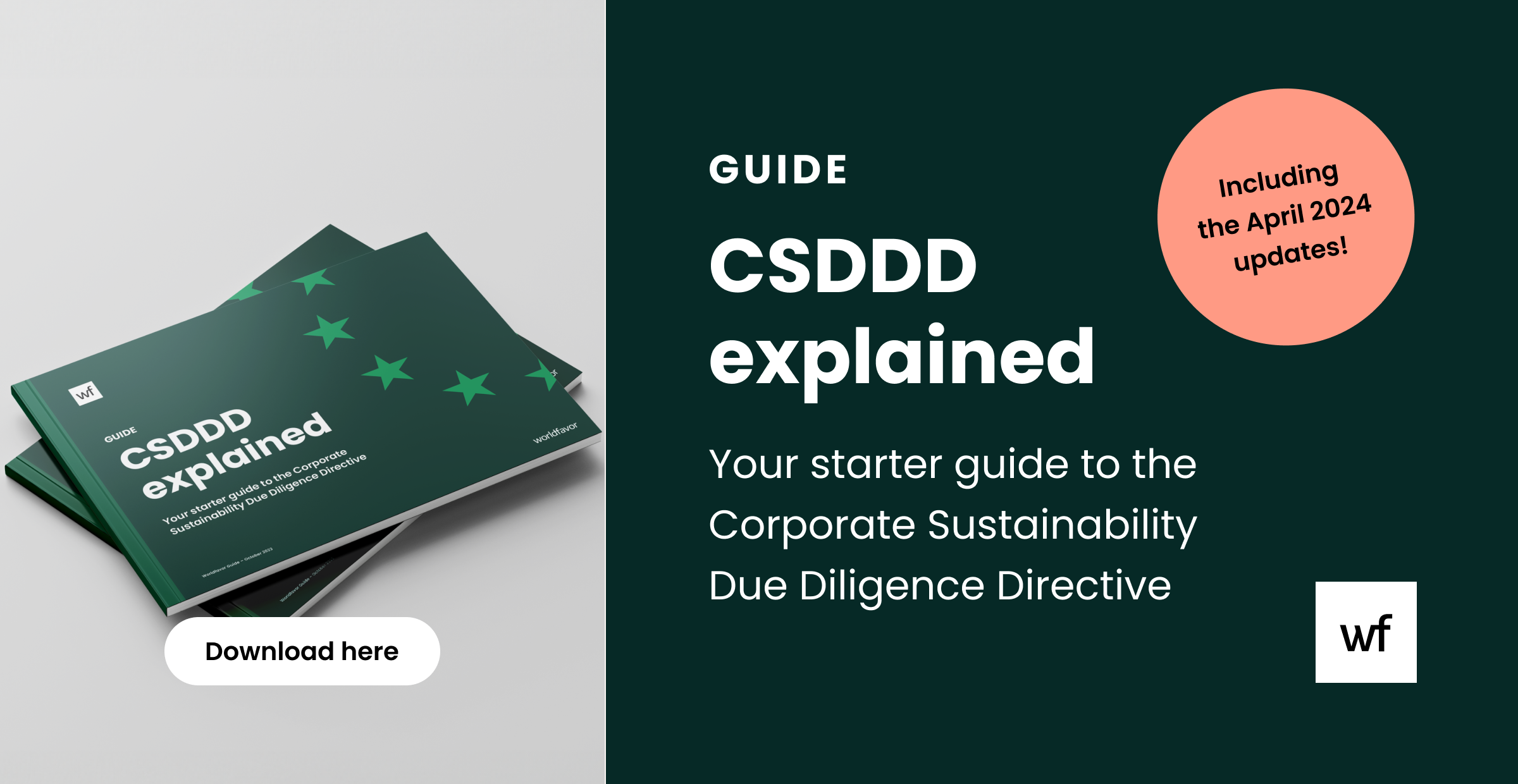Due Diligence explained: a guide to responsible business conduct (RBC)
Discover the essentials of human rights and environmental due diligence (HREDD) and how it shapes responsible business conduct. This blog provides insights on what due diligence is, how to implement it, and its importance in today's regulatory landscape, especially with the upcoming EU Corporate Sustainability Due Diligence Directive (CSDDD).
Want to learn more about the CSDDD? Download our guide:
.png)
Published: November 2024
What do child labor in agriculture, water pollution in pharmaceuticals, and inadequate wages in textiles have in common? They are all sustainability challenges rooted in complex supply chains. Fortunately, these issues can be addressed through a method that's becoming standard in responsible business conduct: human rights and environmental due diligence (HREDD).
While due diligence isn't a new concept — having been adapted for human rights following the UN Guiding Principles for Business and Human Rights (UNGPs) in 2011 — its relevance has grown. With the upcoming Corporate Sustainability Due Diligence Directive (CSDDD), companies must incorporate environmental considerations alongside human rights.
In this blog, we'll cover what due diligence is, why it matters, and how companies can get started to implement due diligence within their supply chain.
What is due diligence?
Due diligence as a concept has been around for some time, both in the legal and the financial context. It is an effective method for collecting and analyzing data to inform decisions while considering identified risks. In other words, due diligence helps prevent damage — be it financial, legal, or reputational. In sustainability, it’s crucial for protecting people and the environment from harm.
There are different focuses for due diligence within sustainability, including:
- Human Rights Due Diligence (HRDD): Concentrates on human and labor rights.
- Environmental Due Diligence: Addresses environmental risks.
- Human Rights and Environmental Due Diligence (HREDD): Links the two, acknowledging their interconnected nature.
Why is supply chain due diligence important?
Corporate scandals related to human rights violations or environmental disasters can severely impact a company's reputation and financial standing. Due diligence serves as a proactive measure to identify and mitigate these risks. It's particularly crucial for companies with long, complex supply chains in regions with low transparency and insufficient labor protections.
With increasing legislation mandating due diligence — such as the CSDDD and others — companies must adopt due diligence to remain compliant and competitive. Implementing HREDD not only enhances your sustainability efforts but also builds trust with stakeholders.
Implementing Human Rights and Environmental Due Diligence (HREDD) is essential for organizations aiming to enhance sustainability and foster trust with stakeholders. By integrating due diligence into operations, companies can meet legal requirements, identify risks early, and engage stakeholders effectively, all while preventing potential reputational damage. This proactive approach not only mitigates risks but also transforms them into opportunities for positive change.
The greater the insights, the bigger the impact
The harsh reality is that a staggering number of people, estimated at 16 million, are trapped in forced labor within the supply chain of international companies. On top of that, companies’ supply chains often account for over 90% of their emissions.
It’s clear that for a company that wants to act sustainably, it needs to manage its due diligence, not just its direct operations - but also supply chain. This is why there's a global shift of introducing tougher laws, making sure companies are responsible for every step that leads to their final product.
How is due diligence conducted?
The UN Guiding Principles (UNGPs) set the global standard for corporate responsibility in respecting human rights. They are groundbreaking as they introduce human rights due diligence (HRDD) as a risk-based approach applicable to a company’s operations, supply chains, and business relationships. The principles provide a step-by-step guide, companies will be able to identify, prevent, mitigate, and account for negative impacts on human rights.
Additionally, the OECD, also working extensively on responsible business conduct, has developed and published its due diligence guidelines for companies that build on the UNGPs. These guidelines include a six-step model that addresses human rights, environmental issues, and governance:
- Embed responsible business conduct: Integrate due diligence into company culture.
- Identify and assess: Recognize risks in operations and supply chains.
- Cease, prevent, or mitigate: Take actions to address identified risks.
- Track: Monitor the effectiveness of measures taken.
- Communicate: Report findings and actions.
- Remediate: Provide solutions for any harm caused.
These steps should be revisited regularly to adapt to changing contexts and emerging risks.

When is due diligence conducted?
Due diligence is not a one-off task; it should be an ongoing process!
Companies should reassess their supply chains, particularly when launching new products or entering new markets. This continuous evaluation will proactively help identify new risks, and thereby enabling resilience and ensuring compliance with evolving regulations.
Tips for implementing a solid due diligence system
To meet current and upcoming legal requirements effectively, consider the following steps:
- Study existing guidelines: Familiarize yourself with the UNGPs and OECD guidelines.
- Conduct a gap analysis: Identify missing elements in your current practices.
- Develop robust policies: Make sure you have comprehensive sustainability policies in place.
- Engage stakeholders: Identify and communicate with key stakeholders in your supply chain.
- Monitor progress: Regularly assess your due diligence efforts and adjust as needed.
- Establish reporting mechanisms: Create a process for documenting and reporting due diligence activities.
Due diligence is now a cornerstone of responsible business conduct. While it may seem complex, understanding and implementing this process is essential for any company aiming for sustainability.
Worldfavor is here to guide you through this journey — want to know more? Book a free demo today!
Related blog posts you might like:






%20as%20the%20deadline%20approaches.%20Learn%20about%20compliance%20requirements%2c%20potential%20delays%2c%20and%20key%20updates..png)

